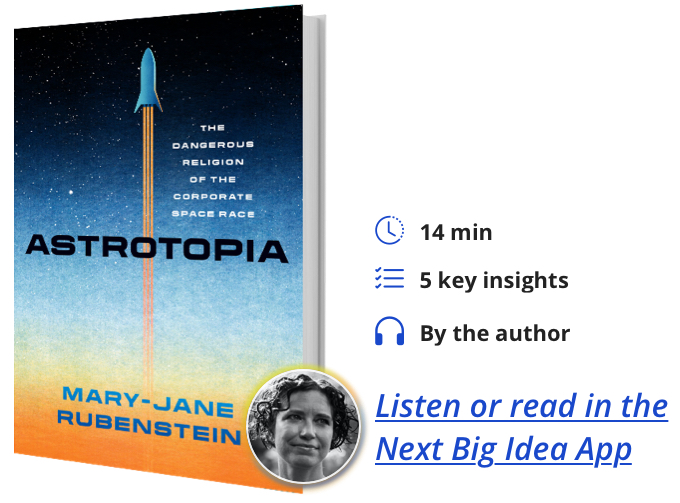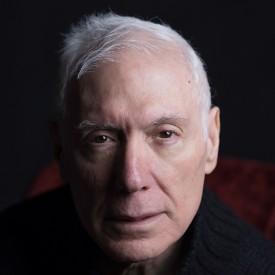Mary-Jane Rubenstein writes about the mythological assumptions beneath contemporary science and philosophy. She teaches Religion and Science Studies at Wesleyan University.
Below, Mary-Jane shares 5 key insights from her new book, Astrotopia: The Dangerous Religion of the Corporate Space Race. Listen to the audio version—read by Mary-Jane herself—in the Next Big Idea App.
1. The billionaires who want to colonize outer space sound like old-fashioned prophets.
The end is near. The earth is not our home. We’re in this world, but not of it, and if we cling too tightly to our terrestrial prison, we’ll surely die. But if we heed the word of the prophet, we’ll follow him out of this veil of tears and into a new land, a better land, where we can finally be free and our generations will endure forever.
We’re used to hearing this kind of story—coming disaster, other-worldly salvation—from the Bible, or the sermons of 17th century Puritans, or the annals of Mormon history, or that guy on the street with a long beard and a sign telling us to repent. We know it all too well from the charismatic religious movements that spring up from time to time, build a utopia in some far-off corner of the world, and end in unbearable violence. Yet here it is in the mouths of billionaires: a barely-disguised doomsday prophecy instructing us to leave the Earth.
The best-known of these techno-prophets are Elon Musk and Jeff Bezos. Both of them are telling us the end is coming and the future is elsewhere, but with different details. For Musk, something is going to wipe out all of humanity—whether it be an asteroid, nuclear war, AI robots gone wild…. so unless we want people to go the way of the dinosaurs, we’re going to have to find a back-up planet, and the best candidate is Mars.
For Bezos, the problem is more gradual: we’re using too much energy. There simply isn’t enough power to keep running our first-rate hospitals, chilling our high-end microbrews, and charging our endless devices. So unless we want to stop living this lavishly, we’re going to have to live elsewhere, and the best candidate is (drumroll): rotating space pods in near-Earth orbit.
Given what we know about religious utopias, something ought to be telling us not to trust these kinds of promises. And yet the last ten years have seen more and more of the U.S. space sector given over to private corporations, whose obligation is to maximize profit for shareholders, and yet who tell us they are leading us to an other-worldly land of salvation and freedom.
2. Religion tends to show up where it’s least expected—like, in space.
A former student of mine wrote a whole senior thesis based on the astonishment she felt when she visited a space museum, popped in an old recording of the Apollo 8 mission, and heard astronauts Frank Borman, Jim Lovell, and William Anders reading the first chapter of Genesis as they orbited the moon. “Genesis?” she thought. All that science! All that military training! All those wires and communications devices and rocket fuel and precise gravitational calculations, and at the self-proclaimed height of human attainment, these astronauts are reading Genesis.
The farther you get into the history and present of space exploration, the more you find religion all over the place. Like Wernher von Braun, the former Nazi rocket scientist who designed the Apollo prototype and set the broad stages the U.S. is still following as it aims for a permanent presence in space. As he undertook deNazification on American soil, von Braun became a born-again Christian and began to insist it was God’s will that America conquer space for Christ.
“Just as billionaire spacemen cloud their fiscal motivations with ideological fog machines, so do politicians and scientists at the other corners of the space program.”
More recently, in 2019, Vice President Mike Pence revealed that the vision hadn’t changed, when he assured the National Space Council that wherever the U.S. sends its astronauts, “there [God’s] hand will guide us. And His right hand will hold us fast.” (The text comes from Psalm 139). One year later, Donald Trump sealed the divine-providence deal by calling outer space America’s “manifest destiny.”
“Sure,” you might say—“but those are politicians. The scientists aren’t using this sort of religious rhetoric.” If that’s the case, then why do they keep naming their missions and machines after gods? One might think of Mercury, Apollo, Orion, Osiris, and the newly-launched Artemis, whose intention is to establish a permanent human presence and a vibrant new economy on the Moon.
Okay, so what are we to believe? That politicians and scientists are actually religious in spite of themselves? Probably not. But just as billionaire spacemen cloud their fiscal motivations with ideological fog machines, so do politicians and scientists at the other corners of the space program.
Ask the American public if they think it’s a good idea to mine the moon within an inch of its life and turn it into a “cosmic gas station” (this is a direct quotation from a space mining CEO competing for government contracts), and you might get some pushback. Ask the American public if it supports The Artemis Mission, and we’re all so entranced by mythical images of a goddess with flowing hair, bow-and-arrow, and a moonlit companion stag, that we couldn’t possibly say no.
3. Things are bad out there.
Before the launch of the Russian satellite Sputnik in 1957, Earth had precisely one satellite: the Moon. Now it’s got the remnants of everything that’s ever been up there, including operative satellites; defunct satellites; pieces of shrapnel; nuts, bolts, sprocket kids; fumbled cameras and cell phones; and the International Space Station. To make matters worse, Elon Musk launches sixty new satellites into orbit every two weeks. By 2027, he aims to send forty-two thousand satellites into low-earth orbit so that he can build the fastest Wi-Fi network ever.
And our poor astronomers are going out of their minds. With all the light bouncing off these thousands of satellites, they say, they can barely see the stars. Meanwhile, Indigenous communities in Australia are distraught over the pollution of the skies, which are sacred to them. (Which ought to be sacred to all of us.) How is Musk allowed to launch this many satellites into orbit? Because the FAA lets him do it. How is the FAA authorized to make decisions that affect not just the U.S. but the entire planet? Well, it’s not—but who’s going to stop it?
There are international agreements—a big one in particular called the Outer Space Treaty—that hypothetically ensure we all behave ourselves in space. The problem is, the treaty is outdated, full of loopholes, and totally unenforceable. For example, even though the Outer Space Treaty forbids any nation from claiming part or the whole of a celestial body (say, the Moon), the U.S. has decided it doesn’t forbid claiming the stuff in a celestial body, like water and helium-3 on the Moon, or rare-earth and precious metals from an asteroid.
“There are international agreements—a big one in particular called the Outer Space Treaty—that hypothetically ensure we all behave ourselves in space.”
And, of course, if you’re NASA and you’ve commissioned a company like Solar System Resources to sink mines on the Moon (NASA has done this), you’re not going to let anyone else near that mine, so you’ll have security. You’ll have fences and armed troops. You’ll have Guardians from the U.S. Space Force. So you’ve effectively claimed that part of the celestial body. For this reason, numerous nations are complaining that the U.S. is in violation of the Outer Space Treaty. In response, the U.S. says it isn’t. And that’s more or less the end of it. Again, who’s going to stop them?
Meanwhile, China, Russia, and the U.S. now have branches of the military dedicated to waging extraterrestrial war; Richard Branson is selling $200,000 tourist tickets on his notoriously unreliable space plane; and some astronautic start-up says it’s going to build a Ferris wheel-shaped orbital space hotel and name it after Wernher von Braun.
And in the midst of all of it, Jeff Bezos takes his hero William Shatner up through the atmosphere, only to watch him burst into tears when he comes back, fumbling for the right words after all those years he spent longing for outer space, pretending he was its captain, when he’s suddenly realized that our only possible home is Earth. “That’s death,” stammers an aging James T. Kirk, baffled and horrified as he points toward the emptiness of space, “and this,” he says, pointing toward our only Earth, “this is life.”
4. Space isn’t going to solve our problems.
Whatever our biggest concern might be, living on Mars with Elon Musk or in an extraterrestrial shopping mall with Jeff Bezos isn’t going to solve it. An asteroid might just as well hit Mars as Earth; nuclear war might break out in space colonies as easily as it might break out down here; and bounding around in one-third Martian gravity or using infinite energy in a space pod won’t be nearly so exciting when the oxygen runs out.
In the end, we’re not going to save ourselves by finding more worlds to ravage and more resources to plunder. By conquering space the way we’ve conquered Earth, we’ll just be exporting the whole disastrous system out to our wider cosmic neighborhood. In fact, if we continue on the path we’re currently on, we might get to the point where we pile so much crap into orbit around Earth that we lock ourselves inside a halo of trash, unable to launch anything at all—trapped by the mess we’ve made inside of the mess we’ve made.
5. There are other ways to live.
One early review of Astrotopia said that the arguments were perfectly sound but annoying and unrealistic. It’s hopeless, said the reviewer, to try to stop these billionaires from building their dreamworlds; I mean, what are we going to do, abolish capitalism?
I face the same problem when I ask my students to consider the alternative that Jeff Bezos rejects. We’re using too much energy, he says; we can’t go on like this. So either we stop using so much energy or we leave the planet in favor of solar-paneled space islands. To Bezos, the choice is clear: life without infinite energy is boring, and therefore not really an option.
To my students, the choice is also clear, although they feel terrible about it: how could we possibly get people to use less water, buy less stuff, give up their cars? Clearly that’s impossible, so we’re going to have to leave the planet. At which point, I ask them: how did it become more thinkable to live without water and air than to live without smart phones? It seems the old saying is right: it is easier to imagine the end of the world than to imagine the end of capitalism.
“Other ways of living are right here before our eyes.”
But there are some people among us—lots of them, in fact—who can imagine the end of capitalism. For them, living less comfortably on Earth is easier to imagine than living without Earth. So it’s here that we might turn down the volume on the techno-prophets and listen to other voices instead.
Throughout the planet, there are communities that have managed to live on their land without destroying it. There are authors and artists who have brought whole worlds into being on principles of kindness, equality, and justice. And there are religious sages who teach us that the Earth is sacred, that the Earth is divine, a gift of God or the gods, and as such is not here to support our untrammeled profiteering.
Such sages include Pope Francis himself, who insists that the Earth belongs to the poor, that all living creatures are our siblings, and that the kingdom of God cannot be built on extraction, exploitation, and greed.
That is what I’d say to the space messiahs. More importantly, it’s what I’d say to the humans among us who feel carried off by their utopian promises. Other ways of living are right here before our eyes. And if we take them seriously on Earth, they might even teach us how to explore outer space without ransacking it, how to live on new land without exploiting it, and how to value knowledge, relationships, and life itself over profit.
To listen to the audio version read by author Mary-Jane Rubenstein, download the Next Big Idea App today:

































